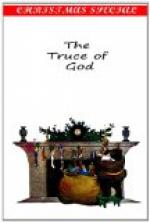Rodolph had no sooner reached Forchheim, than it was announced that a general diet would be held there for the discussion of matters of vital importance to the Church and State, with the suggestion that the absence of the king would facilitate their deliberations. The Count Mangold de Veringen was despatched to the Pope, inviting him to sanction the diet by his presence, to aid them by his wisdom and intrepidity, and to take the helm of the tempest-tossed vessel of state. He was also commissioned to inform His Holiness of their determination to elect a new king. The Pope, in reply, conjured them not to be precipitate, and to wait his arrival before they acted.
There was one feature in the proposed diet to which Gregory objected—the attempted exclusion of Henry from any participation in it. This he endeavored to remedy by obtaining a promise from the emperor to attend the meeting in person. It was partly to avoid the appearance of partiality, but principally in the hope of reconciling the angry factions, that the Pope requested the presence of his unscrupulous antagonist. Henry not only recoiled from his engagement, but, by blocking up all the avenues to Forchheim, compelled the Pope to remain at Carpineta, unable either to enter Germany or return to Rome.
Bernard, cardinal deacon, Bernard, Abbe of St. Victor, and the celebrated Guimond, the Papal legates, announced to the confederates the desire of His Holiness that they should wait his arrival. But the assembled nobles dreaded the least delay. Already their cause was weakened by indecision, and a hostile army was in the field, receiving daily accessions. Though May had been fixed for the opening of the diet, so great was the impatience of Rodolph and his barons, that it was concluded in the middle of March. No sooner had the legates delivered their instructions, than deliberations were virtually begun. The chiefs directed all their efforts to induce the legates to sanction the election of a king, and confirm their choice. Guimond and his companions, faithful to their instructions, replied: “It were far better to await the arrival of His Holiness”; but they added, imprudently, “that they did not wish to oppose their advice to the wisdom of the princes, who knew much better than they what was most conducive to the interests of the State.” Assuming an implied permission to act from these words of courtesy, the nobles proceeded at once to cast their votes. A scene of confusion ensued, created by the jarring of private interests. These were finally quelled by the interposition of the Papal legates, and the balloting proceeded without interruption. The vote of the bishops alone remained to be taken. The Archbishop of Mayence rose, and exercising his prescriptive title, gave the first voice for Rodolph of Suabia. Adalbert and the other bishops followed his example. Otto, Welf, Berthold, ranged themselves on the same side, and amid universal acclamations Rodolph was proclaimed king.




